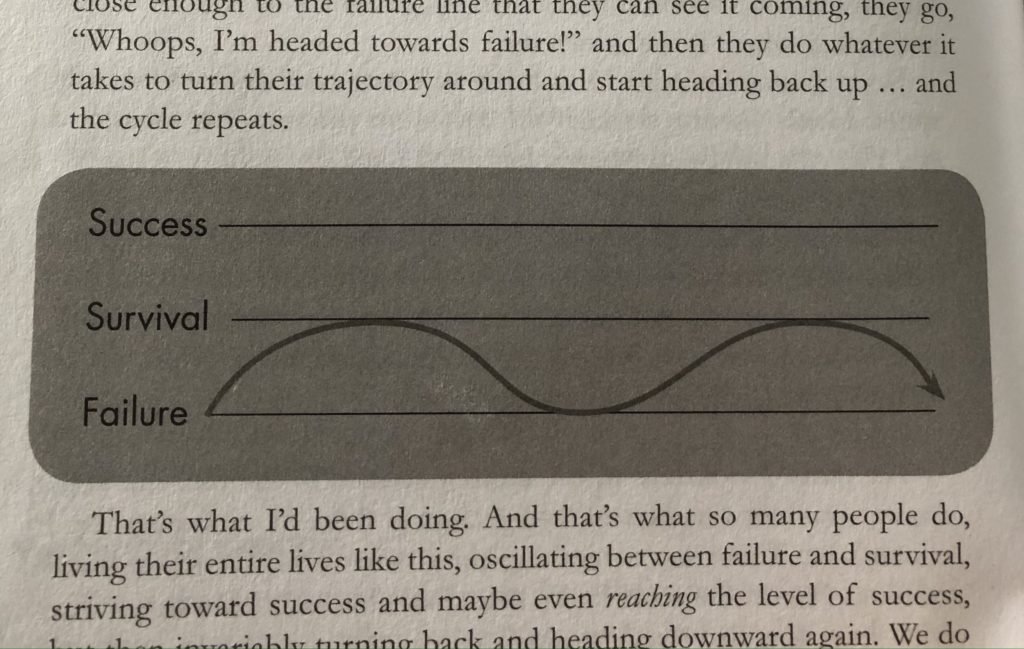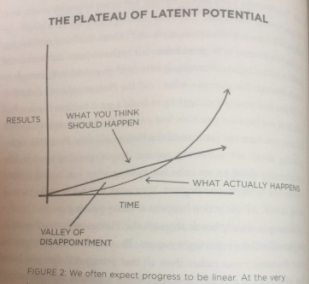Small shifts vs large leaps, which is better? While we would all rather make giant leaps in any endeavour, it’s the small shifts which can be maintained over the longer term. A good example is joining the gym with the goal to get a “perfect” body and fitness level in just a few months. The shift from lying on the couch to working out every day is too much! Most will quit within a month or two. Old habits are engrained and the new habit is too much to contend with.
Gyms know this when people join in January. That’s why they will ask for a 12 month contract! Most will stop coming by March!
The same can be said for building an online business. In theory we would like to be super profitable in no time at all. So we set a goal of making 10K a month in the first year. When this doesn’t happen, we are disillusioned and quit! What we often don’t realise is that all our old habits, thoughts and behaviour patterns are working against us. They don’t support our new ventures. In order to change our behaviour for the long term, we need to start with something small.
Small Shifts Vs Big Leaps
I teach martial arts, Wing Chun Kung Fu to be more precise. Checkout my Kung Fu class in Leeds here. One of the goals for a lot of people is to attain a black belt in martial arts, and often students will start with this in mind. However, this can work against you because a black belt requires years of practice, and dedication. What if you don’t like the class? When the reality doesn’t live up to the fantasy, most will drop out. Only around 1% will keep going and attain this level of achievement.

I recently started learning Kung Fu from a new teacher (from a different lineage). It was a lot different from what I had done previously. If I had aimed at getting my black belt, or similar achievement in this new style, I would have dropped out by now! Instead, I only focused on turning up to a class every week. I’ve managed to keep up this habit for 3 years now, with only the odd week missed.
It is the small things we can do on a daily basis which create change, not the large leaps we think we need to make. As Bruce Lee said “long term consistency trumps short term intensity”.
A fad is when you think you can suddenly change your life with some new, instant inspiration. While inspiration can help you change, it’s consistency which makes the difference.
Small Shifts Vs Large Leaps In An Online Business
In my online business, I haven’t always been consistent. In the first instance, I blogged for a while. Then I stopped, looking to see whether my blogging would “work” to create the income I wanted. It didn’t! So I stopped! I would spend several weeks procrastinating about what I should do, without doing anything of note! Then, a sale would drop in from the blogging. I would be inspired again and get busy blogging every day.

Some time would pass, and I would look for more sales, which didn’t come! So I would stop again! Look at what I was doing and wonder if it was actually working! Then, after another few weeks of procrastination, another sale would drop in! Back to blogging! This pattern continued until I built up my belief in what I was doing. Once my blogging became habit, the sales started flowing again.
It is this approach which happens in everything. We work at something we want to achieve, look for results, and hesitate. The same is true of the gym analogy. When we work out regularly we feel better and look better. But as we look for the results and don’t see them (because we look too soon), we doubt whether our efforts are being rewarded.
Working out every week for 3 weeks in a row will seldom bring about the long term change we desire. Much like learning a musical instrument for 3 weeks won’t make us great at it, either! Or, learning a martial art for 3 weeks will enable us to defend ourselves.
But the power of habits over the long term is much more powerful.
The Stop Start Habit
Most people are hardwired in the stop start habit. They see some results and celebrate, loosening their good habits and falling back down the curve towards “failure”. Or, worse still, they look for results, don’t see them, and quit their good habits (as with the gym analogy).

The comfort zone is a psychological phenonenum which exists throughout life in many facets. Look at how this works in your own life. At what stage do you tidy your house? Perhaps once it reaches the lowest acceptable standards which you set? At what stage do you consider changing your job/income? When you have had enough of not having enough money, or when the stress of it easts into your happiness.
The above curve shows how we aspire for something in life, but then lose our motivation when it appears, dropping back into our comfort zone (and our old habits).
To shift this curve upwards we need to raise both the lines of our dreams/goals and of our lowest acceptable standards.

Summary
While slight changes in your behaviour can seem almost irrelevant, over time small shifts can have the largest impact. Imagine how much difference working out for 30 minutes a day will make over 10 years. Compare a version of yourself who has done that (for 10 years) with a version which hasn’t. The different will be quite dramatic. Or a version of you which drinks alcohol for 10 years compared to one who doesn’t. Apply the same to anything whether it be learning a musical instrument, a martial art of building an online business.
Small shifts can make dramatic differences over long periods and are much easier to sustain than large monumental leaps. A large change is harder to sustain due to your pre-existing habits, thoughts and self perception. But small changes are less likely to interfere with your self image, identity and existing beliefs and habits.
Small things matter. Small habits matter. So if you want to make a permanent change in your life somehow, start with something small. Small shifts vs large leaps is the answer.
See also the slight edge


